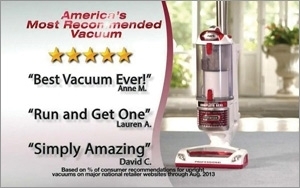BBB: Shark Can't Base 'Most Recommended' Claims On Web Reviews
- by Wendy Davis @wendyndavis, June 12, 2014
 Euro-Pro can't advertise Shark as “America's most recommended” vacuum cleaner when the boast stems from its interpretation of online reviews, the Better Business Bureau's National
Advertising Division said on Thursday.
Euro-Pro can't advertise Shark as “America's most recommended” vacuum cleaner when the boast stems from its interpretation of online reviews, the Better Business Bureau's National
Advertising Division said on Thursday.The NAD said in its decision that “aggregated online data” drawn on by Euro-Pro “did not represent American upright vacuum cleaner consumers,” and therefore wasn't reliable enough to support its claim.
Euro-Pro says it intends to appeal to the National Advertising Review Board.
The NAD's decision stemmed from a challenge to Shark's ads brought by Dyson, a rival vacuum manufacturer. Shark boasted that in ads on television and the Web that its vacuums were the “most recommended.” But Dyson questioned Euro-Pro's methodology, which hinged on a quarterly survey of reviews on sites operated by Amazon, Target and other companies.
Dyson argued there was no evidence that those reviews were authentic, noting that the reviewers were anonymous and “self-selected.” Dyson also said that online review sites often include “fraudulent” posts, citing a frequently-quoted statistic that up to 25% of Yelp reviews are phony.
The NAD found problems with Euro-Pro's use of the reviews -- but the organization stopped short of condemning all use of online reviews in ads.
“In light of the ever-changing landscape of consumer information available online, NAD is not surprised that advertisers are now seeking to use this data as a basis for advertising claims,” the group wrote. “While NAD is open to advertisers using new technology and information to support their claims, the standards of truthfulness, reliability and representativeness to which advertiser’s substantiation is held remain the same.”
The NAD said it was “concerned” that people who post reviews of Shark might not be representative of all U.S. vacuum-cleaner purchasers, noting that Amazon accounts for only 2% of sales, but 42% of reviews. “This disparity indicates that online purchasers are far more likely to submit online reviews than those who purchase vacuums in stores,” the group wrote.
The NAD also noted that many of the reviewers didn't state whether they were recommending the product. Shark didn't use those posts to support the contention that it's the most recommended brand; that decision called its methodology into question.
“Because nearly half of the online reviews collected by the advertiser were not used to support its claim, it is not clear whether the advertiser’s data is even representative of online purchasers or online reviewers in general,” the NAD wrote.
The organization said that the decision isn't aimed at preventing advertisers from ever drawing on crowd-sourced data in ads. “This decision simply restates a fundamental principal of advertising law, that the data set submitted in this proceeding, like any other population sample, must be shown to be representative of the consumers that it purports to represent,” the NAD wrote.
Euro-Pro told the NAD that it is updating its ads to state, “most recommended Vacuum brand online." But the company also says it believes it should be able to draw on online reviews to advertise its vacuums as "most recommended." It intends to appeal the NAD's decision to the contrary to the National Advertising Review Board. That group typically decides a case within 90 days of an appeal.


